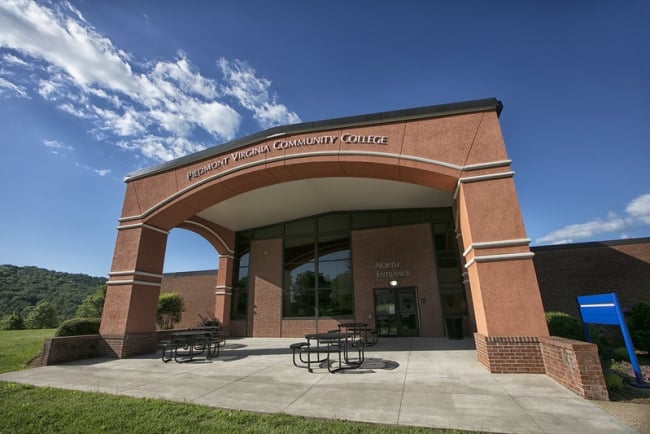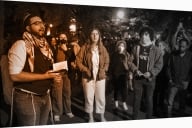You have /5 articles left.
Sign up for a free account or log in.

The Louisa County Board of Supervisors resolved that Piedmont Virginia Community College won’t receive funding from them for the 2025 fiscal year.
The Louisa County Board of Supervisors unanimously voted to withhold its share of funding from Piedmont Virginia Community College (PVCC) on Monday after its Students for Justice in Palestine chapter showed a documentary film on campus.
Screenings of the documentary, Israelism, have sparked controversy on some college campuses in the wake of the Israel-Gaza war. The film, produced by Jewish filmmakers, is about two young Jewish Americans who question and ultimately abandon their support for Israel after traveling in the region and engaging with Palestinians.
The Board of Supervisors’ resolution noted that “antisemitism remains a serious concern on a worldwide basis, and the Board of Supervisors condemns any discrimination in the strongest terms” and “public funds should not support platforms for antisemitism or discrimination.” The board resolved to “suspend funding for PVCC in fiscal year 2025 pending an in-person explanation by PVCC of the college’s stance on discrimination and antisemitism.”
The resolution mentioned the film screening but did not explain what about the film or the SJP chapter raised concerns about antisemitism.
A statement from the college to Inside Higher Ed expressed dismay over the move.
“We regret the decision by the Louisa County Board of Supervisors to withdraw funding from Piedmont Virginia Community College, pending an in-person explanation,” read the statement. “PVCC has served the community since 1972, benefitting hundreds of thousands of students who rely upon the College’s affordable, accessible programs to support their career development. We ask that the Board reconsider their decision, as the College plays a crucial role in supporting the community.”
The college’s statement noted that the campus is “committed to fostering a safe environment for freedom of expression” and “like the Board, the College condemns any discrimination in the strongest terms."
The statement did not address whether PVCC officials would provide the board an in-person explanation of the college’s position on discrimination and antisemitism.
The sum denied to PVCC was a mere $5,859, a fraction of the college’s proposed $500,600 operating budget for the 2024–25 academic year, according to information from this week’s college board meeting on the PVCC website. The college, which enrolled almost 4,600 students this spring, gets funding from six other counties and the city of Charlottesville, where the main campus is located. But the move is symbolically dramatic at a time when community colleges have, by-and-large, not experienced the tumult their four-year counterparts have been embroiled in as students have clashed over campus protests and encampments related to the Israel-Gaza war.
Duane Adams, chairman of the Louisa County Board of Supervisors, posted on Facebook a day before the Israelism screening that he was disappointed the movie was being shown and could not “in good conscience support funding for an organization that allows a blatantly antisemitic organization use of their facilities.”
He wrote in a statement to Inside Higher Ed that the board has the right to withhold funding from the college until the college communicates with them about the issue.
“The County unequivocally does not condone hate speech, including antisemitism, in any form,” he wrote. “We aim to foster a community that values diversity, inclusivity, and respect for all. While rights under the First Amendment are tremendously important, so is a stance regarding discrimination and antisemitism. The Board’s intent is to ensure that the college does not support antisemitic activities on its campus and intends to clarify the college’s stance with a simple conversation with leadership.”
He said the board has the “the discretion to provide financial support to organizations that align with the County’s goals, mission, and values” and “may withhold or reduce funding from organizations that do not effectively contribute to the County’s objectives.”
He called it a “standard practice” for a college to update the Board of Supervisors.
“Through open communication, organizations are able to help the Board make informed decisions,” he said. “These updates and discussions strengthen the partnership and shared goals between organizations and the Board, ultimately benefiting the community they serve.”
County funding levels to Virginia community colleges vary year-to-year, and this isn’t the first time a Virginia county has denied funding to a community college.
The Frederick County Board of Supervisors decided not to offer funding to Laurel Ridge Community College last year, a first in the college’s history, The Winchester Star reported. Members of the Frederick County board said they suspended the funds because the college spent too little on student scholarships. But county residents and board candidates at the time speculated that the real reason was because the college changed its name from “Lord Fairfax Community College” in 2022 because its namesake was a slaveowner.
Pushback to the Backlash
Some Louisa County residents have criticized the board’s decision not to fund the college.
Mary Kranz, a county resident for at least 50 years, who’s taken classes at PVCC, started a GoFundMe page to raise the nearly $6,000 denied to the college. She’s garnered about $400 in donations so far.
She said she was concerned by the board’s lack of transparency about the decision. She noted that no public notice was provided about the vote—it wasn’t listed on the Monday meeting agenda—and that it was not publicly discussed before it was voted on. She also believes student debate is part of a “quality education.”
“A community college needs to have discussion where both sides can clearly state their views … and our Board of Supervisors just wants to put a clamp on that,” she said.
Louisa County is a rural area that leans rightward in polling data, but Kranz said it hasn’t had the kinds of “culture wars” nearby counties have experienced, such as infighting on local school boards over various political issues.
“We’ve managed to avoid that, but this puts us right in the middle of it, and I regret that,” she said.
Whether or not the move was legal is also in question.
Haley Gluhanich, senior program officer for campus rights advocacy at the Foundation for Individual Rights and Expression, a free speech advocacy organization, said, in general, even if student activists were making antisemitic statements, “hate speech” is legally protected under the First Amendment, unless it’s coupled with a form of unprotected speech like “discriminatory harassment” that’s “so severe, pervasive and objectively offensive that it can be said to deprive the victim of access to educational opportunities.”
“Government entities, whether that be a public university or college or a government official, a department of the government, federal level, state level, local level … they are obligated to abide by the First Amendment,” she said. The First Amendment also “forbids government entities from viewpoint discrimination.”
She emphasized that these principles apply to speech on both the pro-Israel and the pro-Palestinian sides of current campus conflicts.
“We’re going to give you the same answers, no matter what the view or the opinion is,” she said. Moments of “high tension” are “when the First Amendment is the most important.”
Israelism, which debuted at a film festival last year, has had about 150 official screenings, about half of them on college campuses. There have been a handful of unsuccessful attempts to shut down campus screenings, including at the University of Pennsylvania, Hunter College, Yale University and Barnard University. University of Pennsylvania administrators denied the event official approval, allegedly asked the Middle East Center to cancel, and threatened to take disciplinary action against Penn Chavurah, the progressive Jewish student group hosting the screening. The debacle reportedly led the faculty director of the university’s Middle East Center to resign.
Still, Erin Axelman, co-director and co-producer of Israelism found it “very bizarre” that their film was embroiled in the Louisa County conflict.
The film is “made by Jewish people about Jewish people, about very common Jewish experiences,” Axelman said, noting that “the American Jewish community is incredibly divided. When it comes to support for Israel.”
Axelman, who’s Jewish, was alarmed by the suspension of funds to PVCC and made repeated calls to Adams, the chairman of the Louisa County Board of Supervisors.
Axelman believes the move conflates criticism of Israel with antisemitism in a way that obfuscates actual antisemitism and the board is “weaponizing antisemitism for their own far-right political games.”
“Antisemitism is very, very real,” Axelman said. “Conspiracy theories, stereotypes, the demonization of Jewish people, exaggerations of Jewish power are very, very real and truly threaten Jewish lives … That being said, talking about Palestine, talking about real things Israel has done to the Palestinian people, talking about the real experiences of many American Jews who become disenchanted with Zionism and Israel is obviously not antisemitism.”









